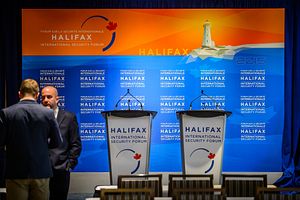From November 17 to 19, 2017, the Canadian coastal city of Halifax held its premier global event for the ninth consecutive year – the Halifax International Security Forum (HISF). Brought to life in 2009 by the Canadian government in association with media partners as well as private sector sponsors, HISF aims to gather around 300 world leaders each year to discuss the most prominent agenda topics concerning not just international security narrowly defined, but a variety of other political issues unrelated to traditional military perspectives.
Just to give some tangible examples, the 2017 HISF has promoted three days’ of heated debate on natural disaster prevention and relief, post-Putin Russia, the press’ responsibility to inform, the future of democracy and global trade, women in conflict, Latin American troublesome politics, and the role of Google, while boastfully claiming to be “advancing a modern vision of security.”
With regard to the Asian continent, a few topics have deserved greater emphasis. To start with, North Korea’s nuclear program was intensively debated on a panel titled “Nukes: The Fire and the Fury,” moderated by The Atlantic’s journalist Steve Clemons and joined by several experts – a diplomat, a general, a politician, and an academic. Some of the session highlights could be credited to Korea University’s Professor Sung-han Kim, according to whom “South Korea and Japan have so far relied on the United States. [But] since North Korea is not complying with denuclearization norms, it’s time to start thinking of a plan B.”
Kim, who has served as a vice-minister of foreign affairs and trade in his country, strongly believes that the world needs to “bring Pyongyang to the negotiation table,” lest we all might face the consequences of inaction. He was seconded by U.S. Ambassador Bonnie Jenkins, who defended the need “to create conditions for diplomacy and bring down rhetoric,” even as former Israeli Defense Minister Moshe Ya’alon seemed to be indirectly encouraging Seoul to pursue their own nuclear program – “Egypt never dared to use chemical weapons against us [Israel], nor has Saddam Hussein’s Iraq.”
The quote that just stole the show, however, was pronounced by General John Hyten, head of U.S. Strategic Command, who said he would resist an order to use any nuclear weapon on illegal grounds, even if it were a presidential command. All the big media companies around the world quickly and widely disseminated his words, without ever making reference to the country which would have been a potential target for American missiles – North Korea, or the Democratic People’s Republic of Korea.
Elsewhere, in a face-to-face interview with Alphabet Inc.’s executive chairman Eric Schmidt, conducted by Foreign Policy’s editor-in-chief Jonathan Tepperman, again a couple of provocative references to Asia showed up. As far as the rise of China was concerned, Schmidt affirmed it might consist of “the novelty of our lifetimes.” Since Beijing has abundant money to spend and can count on very qualified personnel in the realm of artificial intelligence, China is poised to overcome all competitors by 2025, or 2030 at the latest – he prophesies.
Under the heading “Weaponizing Capital,” a panel devoted to Xi Jinping’s Belt and Road Initiative (BRI) took place on HISF’s day two. This roundtable was made up of U.S. Pacific Command’s General Bryan Fenton, Financial Times’ Edward Luce, ASEAN’s former Secretary-General Keng Yong Ong, the U.S. Navy’s Secretary Richard Spencer, and BBC’s Yalda Hakim. To begin with, Hakim, the moderator, compared the BRI with another historic initiative of the kind – the Marshall Plan – insofar as Xi’s signature policy is bound to reach nothing less than 60 countries, and pour around $1 trillion into world markets, in five years’ time. Given China’s very “transactional” diplomatic style, some countries have been wary about the BRI. Should they?
A few strong opinions followed suit. Ong was blunt in expressing his thoughts about the BRI: “We need money for infrastructure, and China has helped many ASEAN countries [so far]. China’s strategy is to open up markets. It is a necessary evil, I think.” This double-edged nature of BRI was again stressed by Luce, for whom “Xi has a plan, while Trump doesn’t. In spite of China’s disregard for human rights, countries like the United Kingdom will soon be begging for Chinese money.”
Two very interesting reactions came from the audience. The Council of Foreign Relations’ Luis Rubio commented that China has put more money into Africa “in the last 10 years than the World Bank has in all its history,” whereas Jamaica’s chief of defense staff, Rocky Meade, asked why an alternative “coalition of the willing” was not standing against China as a means to offer U.S. allies an alternative pathway, provided that countries actually needed money to build their infrastructure. At the end of day, China’s rise was seen more as a threat than as a global stabilizer by panelists.
As a frequent attendee of the Halifax Forum – who has taken part in four annual editions over the last five years – I note with satisfaction that Asia as a topic has gained momentum and been upgraded from a somewhat peripheral spot to center stage in recent times. Although some debate on Asian issues and their relevance to world affairs was already present at the creation of the forum, I estimate that never before had Asian issues enjoyed so much attention on the part of HISF’s organizers. And considering all that is at stake at the moment, I see no way back: HISF will become more and more Asia-centered in the coming editions. So will international security at large.

































